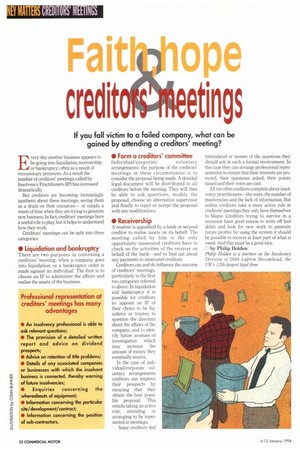If you fall victim to a failed company, what can be gained by attending a creditors' meeting?
Page 34

If you've noticed an error in this article please click here to report it so we can fix it.
F,4 very day another business appears to be going into liquidation, receivership or bankruptcy, often as a result of recessionary pressures. As a result the number of creditors' meetings called by Insolvency Practitioners (IF) has increased dramatically.
But creditors are becoming increasingly apathetic about these meetings, seeing them as a drain on their resources— or simply a waste of time when they are trying to generate new business. In fact, creditors' meetings have a useful role to play, but it helps to understand how they work.
Creditors' meetings can be split into three categories:
• Liquidation and bankruptcy
There are two purposes in convening a creditors' meeting: when a company goes into liquidation; or a bankruptcy order is made against an individual. The first is to choose an IF to administer the affairs and realise the assets of the business.
• Form a creditors' committee
Individual/corporate voluntary arrangements: the purpose of the creditors' meetings in these circumstances is to consider the proposal being made. A detailed legal document will be distributed to all creditors before the meeting. They will then be able to ask questions, modify the proposal, choose an alternative supervisor and finally to reject or accept the proposal with any modifications.
• Receivership
A receiver is appointed by a bank or secured creditor to realise assets on its behalf. The meeting called by him is the only opportunity unsecured creditors have to check on the activities of the receiver on behalf of the bank—and to find out about any payments to unsecured creditors.
Creditors can and do influence the outcome of creditors' meetings, particularly in the first two categories referred to above. In liquidation and bankruptcy it is possible for creditors to: appoint an IF of their choice to be liquidator or trustee; to question the directors about the affairs of the company; and to identify future avenues of investigation which may increase the amount of money they eventually receive.
In the case of individual/corporate voluntary arrangements creditors can improve their prospects by ensuring that they obtain the best possible proposal. This entails taking an active role; attending or arranging to be represented at meetings.
Some creditors feel intimidated or unsure of the questions they should ask in such a formal environment. In this case they can arrange professional representation to ensure that their interests are protected, their questions asked, their points raised and their votes are cast.
All too often creditors complain about insolvency practitioners—the costs, the number of insolvencies and the lack of information. But unless creditors take a more active role at creditors' meetings they only have themselves to blame. Creditors trying to survive in a recession have good reason to write off bad debts and look for new work to generate future profits: by using the system it should be possible to recover at least part of what is owed. And that must be a good idea.
E by Philip Holden








































































